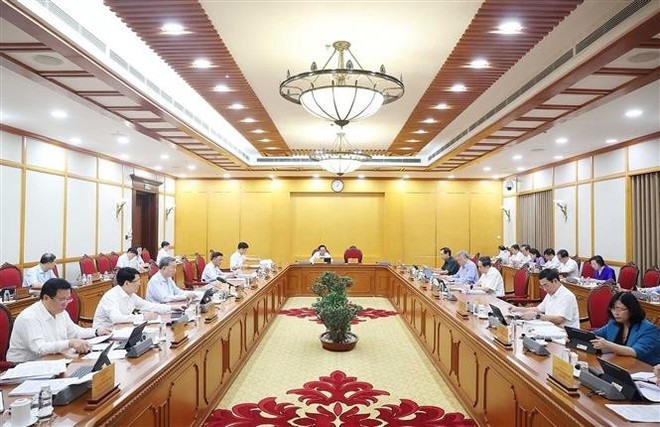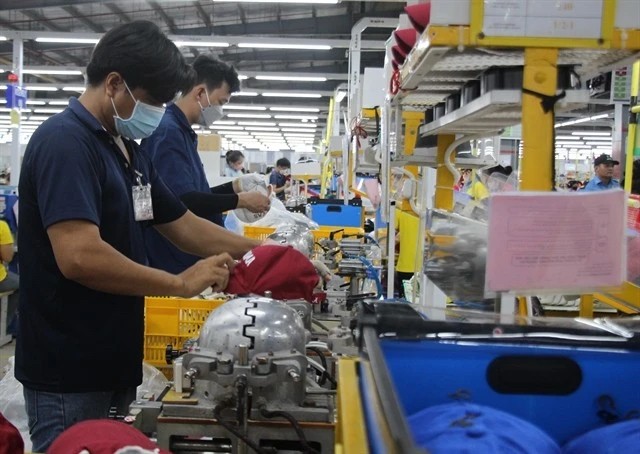Emerging security order in Indo-Pacific highlighted at workshop
An international workshop on “Emerging Security Order in Indo-Pacific: Issues & Challenges” took place in New Delhi, India from July 14-15.
 |
At the event. (Source: Vietnamese Embassy in India)
Speaking at the event, Vietnamese Ambassador to India Ton Sinh Thanh said the Indo-Pacific region is attracting attention in the context of rapid changes in regional and world situation and in power balance along with increasing grave challenges to peace, stability and development.
He noted that the current situation in the East Sea is one of the threats to peace, stability and freedom of navigation, aviation and trade in this region.
The world is witnessing activities to reclaim and construct artificial islands in the East Sea and militarisation via the installment of equipment and weapons, which the Ambassador said is threatening not only the sovereignty of Southeast Asian nations but also the freedom of maritime, aviation and trade of countries outside the region.
The diplomat emphasised the importance of the Indo-Pacific and the East Sea in particular to Vietnam, noting that the country holds sovereignty of not only the Hoang Sa (Paracel) and Truong Sa (Spratly) archipelagos but also 3,000 other islands and islets. With a coastline of 3,260km stretching from the north to the south, Vietnam has more than 1 million sq.km of exclusive economic zone under the United Nations Convention on the Law of the Sea.
He said the East Sea is vital to the Vietnamese economy as it is the country’s main gateway to the world, adding that if the East Sea is occupied, not only Vietnam’s security will be threatened but its economy will also be seriously hurt.
In addition, the Indo – Pacific is also of vital importance to Vietnam as most of its biggest strategic and economic partners are located in the region.
 |
Vietnamese Ambassador to India Ton Sinh Thanh (black suit). (Source: Vietnamese Embassy in India)
The ambassador recalled President Tran Dai Quang’s speech to Indian statesmen, professors, researchers, scholars and students at Nehru Memorial Museum in India in March this year, in which the President called on countries to share a common vision about an open region based on international law and sharing common interest in maintaining peace, stability and inclusive prosperity, in which no country, no ethnic group and no population are left behind.
All countries should strive to defend freedom and unobstructed traffic of maritime, aviation and trade routes so that the Indian Ocean – Pacific will not be pided into sub-regions that are manipulated by powerful countries, impeded by protectionism and pided by insular nationalism, he said.
Ambassador Thanh also urged countries to establish effective mechanisms to maintain peace, stability and the rule of law, ensure common security, prevent conflicts and war, and effectively cope with traditional and non-traditional security challenges.
He stressed that Vietnam’s viewpoint on the Indo-Asia-Pacific region has many similarities with Indian PM Narendra Modi’s vision about the Indo – Pacific as outlined in his keynote speech at the Shangri La Dialogue held in Singapore in June 1, stressing that both Vietnam and India want to engage in instead of confronting in the settlement of regional issues.
Participants at the event shared the view that the Indian Ocean – Pacific is emerging as the most important region with its status as a geopolitical and geo-economical hub, a busy trade corridor of the most importance globally with nearly two-thirds of petrol and one third of global cargo going through it.
However, the lack of cooperation rules and trust building measures, along with unsettled disputes and competition for scarce natural resources are seriously threatening regional peace and stability.
The event at the Indian Council of Social Science Research was co-hosted by the Centre for Canadian, U.S. & Latin American Studies under Jawaharlal Nehru University, and the Kalinga Research Institute for Indo-Pacific Studies./.
Recommended
 National
National
Vietnam News Today (Jun. 7): Prime Minister works with Estonian firms to accelerate projects in Vietnam
 National
National
Vietnam News Today (Jun. 6): Foreign Investment in Vietnam Surges in Five Months
 National
National
Vietnam News Today (Jun. 5): PM sets off for attendance at UNOC 3 in France, official visits to Estonia, Sweden
 National
National
Vietnam News Today (Jun. 4): Vietnam - Promising Candidate for Southeast Asia’s Next Powerhouse
 National
National
Shangri-La Dialogue 22: Vietnam Highlights Some Issues of Ensuring Stability in a Competitive World
 National
National
Vietnam News Today (Jun. 3): PM Pham Minh Chinh to Attend UN Ocean Conference, Visit Estonia, Sweden
 National
National
Vietnam News Today (Jun. 2): Vietnamese Trade Mission Sounds Out Business Opportunities in United States
 National
National
